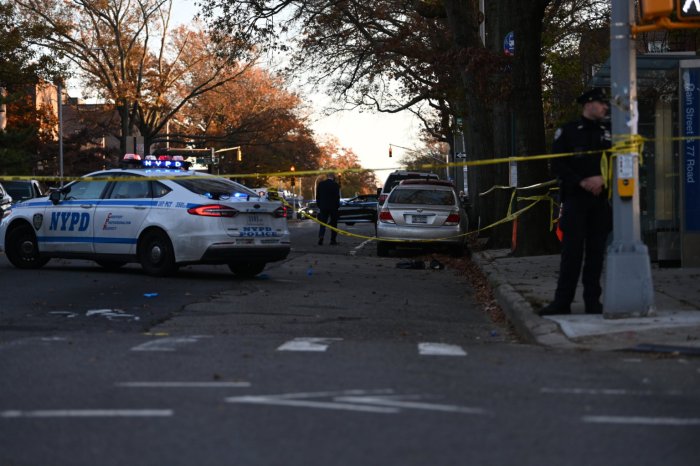“I don’t want to judge what’s in people’s hearts, but it certainly gives force to an old stereotype,”…
By Doug Chandler
“I wouldn’t dare trade the universe for this (experience),” said Stephen Kumar, an evangelist with the Compassion of Jesus Christ Ministries in Jamaica.
“I don’t want to judge what’s in people’s hearts, but it certainly gives force to an old stereotype,” said Manny Behar, executive director of the Queens Jewish Community Council.
Those were among the reactions in Queens to “The Passion of the Christ,” the new Mel Gibson movie that opened throughout the country Feb. 25, which coincided this year with the Roman Catholic observance of Ash Wednesday.
The film, now appearing in nine of the borough’s movie theaters, offers Gibson’s interpretation of the last 12 hours of Christ’s life and began stirring controversy long before its release last week. Leaders and scholars from both the Jewish and Christian communities have questioned how closely the movie hews to the Gospels and whether or not it blames the Jews collectively for Christ’s death, as passion plays throughout the centuries have done.
Reviewers were divided last week over whether the movie is anti-Semitic. Those who say that it could be interpreted as anti-Semitic argue that it downplays the role of the Romans in Christ’s death, turning the brutal figure of Pontius Pilate into a sympathetic character. They also cited the film’s portrayal of Jews as a bloodthirsty mob headed by shrewd and sadistic leaders.
Queens residents interviewed at the Midway Stadium in Forest Hills the day the film opened and at the College Point Multiplex in Whitestone during the weekend offered various reasons for seeing “The Passion of the Christ.”
Dorothy Young and her son, Robert, described the film in terms that would be repeated over and over again.
Standing outside the theater in Forest Hills, the older Young, a Glendale housewife, said she cried through much of the film, which focuses on the suffering Christ had to endure before and during the Crucifixion. “It took my breath away,” she said, adding that she thought the film was historically accurate.
Robert, a 10th-grader at the Cathedral Preparatory Seminary in Elmhurst, a Catholic high school, called the film “great” and said he “didn’t think there was any anti-Semitism at all.”
Some students in his religion class thought the Jews killed Christ, while others said the Romans did, but his teacher said it was “the sinners,” Robert recalled.
Kelly Averopoulos, a Bayside resident, discussed the movie beforehand with some of her colleagues, who work in a mostly Hasidic Jewish firm.
“I had friends who were, like, ‘Why are you going to see it?’” said Averopoulos, 28, an office manager at the firm. Her colleagues said the movie would be anti-Semitic.
But Averopoulos, who described herself as Greek Orthodox, said she saw no anti-Semitism in the film. “I liked it. This is actually how I pictured it [the last hours of Christ’s life].”
Unlike other theatergoers interviewed in the past few days, Mike Sobotka, 55, described himself as Jewish, but he was quick to add that he is also secular, grew up with Irish neighbors and spent “lots of time in church.”
“My brother and sister-in-law said: ‘The movie’s anti-Semitic. How can you see it?’ ” recalled Sobotka, who saw the movie in Whitestone with his Indian-born wife, Chhaya. “I told them that I had to judge for myself.”
What Sobotka concluded is that the film is not anti-Semitic.
“It made a great case study for the hysteria of the mob, both Roman and Jewish,” said Sobotka, a Jamaica resident who sells dental instruments. “The power of the movie depends on how much faith you have.”
Dr. William Shulman, director of the Holocaust Resource Center and Archives at Queensborough Community College in Bayside, said: “I haven’t seen the movie so I can’t really judge.” He added that “almost anything today that would be considered anti-Jewish would increase anti-Semitism to some extent. It doesn’t take much.”
He explained that he does not plan on seeing the movie because it is violent, not necessarily because it may be anti-Semitic.
One theatergoer, Jorge Ortega of Glendale, did admit that he was angered at Jews initially while watching the film. “To tell you the truth, at the beginning I felt a bit of anger toward the people who were treating (Christ) that way, which would be the Jews,” said Ortega, who watched the film with his wife, Sherry, and their two sons, George, 13, and Daniel, 11.
But he said he was affected by “the message of forgiveness” that he found in the movie. Moreover, the film’s main point, he said, was that Christ “suffered for all our sins.”
Eurana Barnes of Bayside saw the film Monday afternoon. As she stepped out of the theater with her grandmother, she had a radiant smile on her face.
“I could imagine what it would have been like to be there,” said Barnes, a Catholic. “I was touched by the compassion that Jesus had for everybody else. I just wonder if I would be able to bear that cross.”
Jewish leaders, meanwhile, remain concerned that the movie could fan the flames of anti-Semitism, which they see as growing throughout the world.
“The movie distorts history,” especially the fact that Jews and Christians were both victims of Roman persecution, and “makes Jews into the force that killed Jesus,” said Behar, of the Queens Jewish Community Council.
Speaking a day after the movie was released, Behar said he had not seen the film and was unsure if he would see it. Viewing the film, he said, “would lend support to something I wouldn’t want to lend support to.”
But he had read “enough reviews” to feel comfortable commenting about “The Passion,” Behar said.
Like other Jewish leaders, Behar believes the solution to what they see as a troubling film would have been easy. He and others have called for Gibson to add “some kind of statement on the screen saying exactly what the Vatican said — that whatever role individual Jews may have had in the Crucifixion, it doesn’t reflect on all Jews then or today.”
The controversy has also prompted the owner of the College Point Multiplex, the Boston-based National Amusements Inc., to give a portion of all ticket sales from the movie to organizations that promote interfaith understanding and religious tolerance.
Reporter Ayala Ben-Yehuda contributed to this story.





























